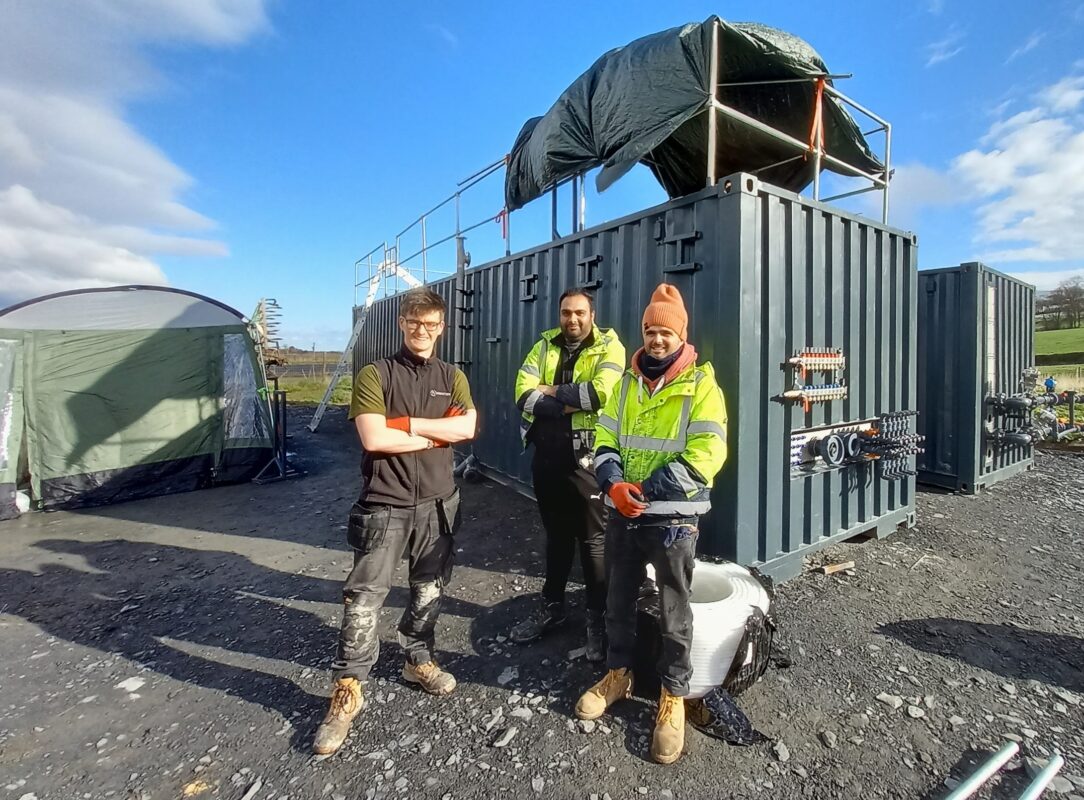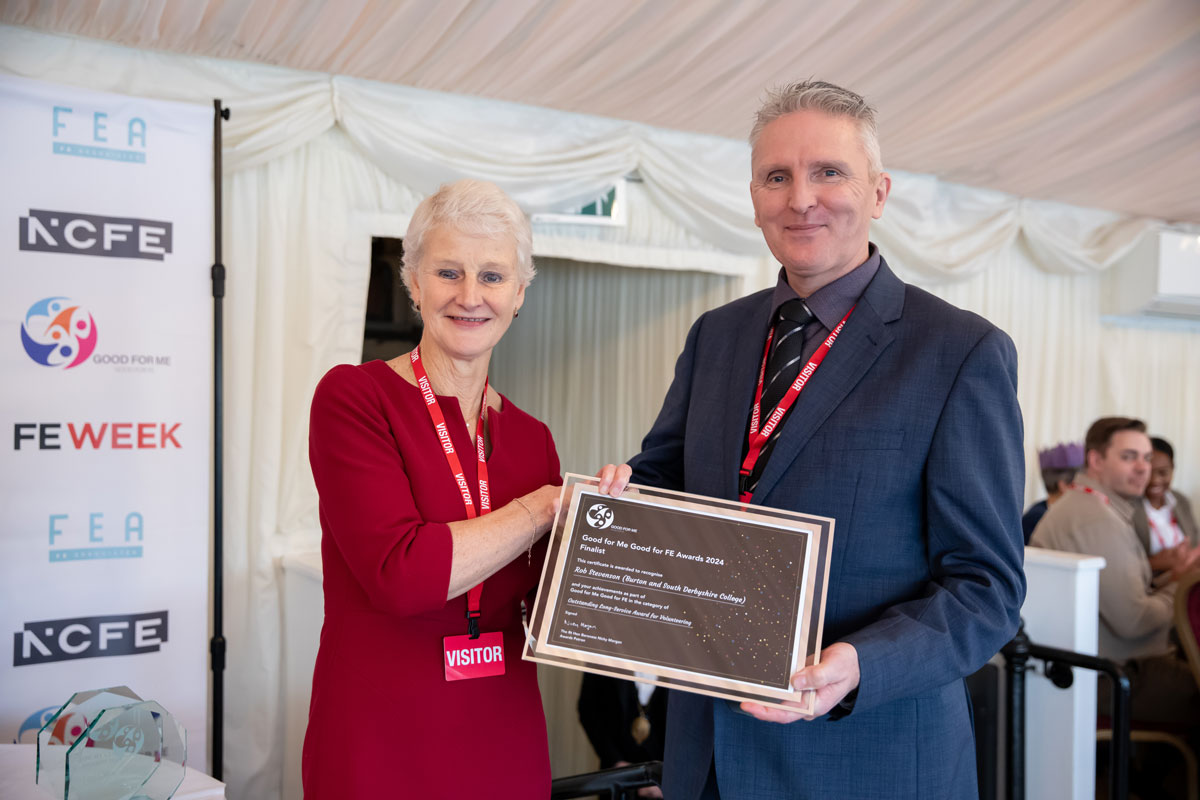Revolutionary college ‘biofactory’ to reduce farmers’ greenhouse gas emissions

AN INNOVATIVE biofactory will support Welsh farmers in reducing greenhouse gas emissions.
The striking anaerobic digestion system was unveiled by Biofactory Energy and Coleg Cambria Llysfasi, supported by Ambition North Wales.
It is one of three low-carbon initiatives jointly funded by a £500,000 grant from Welsh Government via its Whole System Business Research Innovation for Decarbonisation Challenge (WBRID).
The two shipping containers transformed into a prototype plant have been named Neli and Gobaith (Hope) by students at the college and will be painted black and white to resemble dairy cows.
The long-term aim of Biofactory Energy, in partnership with lecturers and learners, is for dairy farms to decrease emissions from slurry management using pioneering technology, and for the system to become commercially viable and applicable to as many farmers as possible.
Project Manager George Fisher says interest and feedback from across the agricultural arena is growing.
“The relevance and importance of this scheme has resonated with farmers in North Wales and beyond, partly because this is a scalable AD solution,” said George.
“Since announcing WBRID funding had been secured the team at Biofactory Energy have worked swiftly and professionally to deliver this incredible technology, which will be of benefit to dairy farmers but also of great educational value to the learners here at Llysfasi.
“It is one of several developments in the pipeline that will have a major impact on the future of the industry in Wales, as we work with key organisations to support and introduce new, sustainable approaches to farming.
“Micro-AD (Anaerobic Digestion) technology will convert greenhouse gas emissions into energy which will have multiple uses on site, from heating water to refrigeration and powering equipment to clean the dairy.
“This is a major step forward and we are excited to see the results.”
Robyn Lovelock, Manager of the North Wales Growth Deal’s Agri-food and Tourism Programme, is delighted to have supported the scheme and to see the demonstration system in place.
She has high hopes for how the technology can benefit residents and businesses within the region, adding: “It is critical to trial solutions that can help North Wales farmers achieve the sector’s net-zero targets, and exciting that Llysfasi is a test site for this emerging technology.
“All three businesses within the WBRID scheme have developed innovative technologies supporting net zero pathways and have the potential to benefit farmers economically with time or cost reductions.
“With the importance of agriculture to the North Wales economy, trialling new technologies here means we can help shape their development to ensure they are fit for purpose.
“Ambition North Wales is proud to have supported Biofactory Energy on their journey. We look forward to seeing the outcome from the trials.”
The dairy farming industry is pivotal to North Wales, employing 7% of the workforce and contributing more than £370m to the economy each year.
The Welsh Government Smart Living WBRID demonstrators or ‘challenges’ apply the tested principles of Small Business Research Initiative schemes and will bring benefits including reduced carbon emissions, energy savings and business economic support with the testing of new machinery, products, systems, and processes.
Llysfasi Farm Manager Dewi Jones said: “We are very much looking forward to trialling and seeing the benefits of this new technology.
The idea of a small to medium scale AD unit appeals to us as it can hopefully be replicated on many farms across Wales, compared to other larger scale AD plants that can be expensive to set up and therefore only available to a few farmers.
“At the end of the day, anything that we can use that helps reduce emissions and also stacks up financially is welcome, and we see this new development as the first of many that we will adopt at Llysfasi in order to decarbonise our future food production at primary producer level.”
Jon Blake, BioFactory’s Chief Commercial Officer, added: “We’re delighted to have the opportunity to work with the teams at Coleg Cambria Llysfasi, Ambition North Wales and WBRID in the development of our Micro-AD Farm system.
“The deployment at Llysfasi represents the incredible efforts of all the individuals and our engineers, and we’re very excited to begin operations.
“The Micro-AD Farm system has been designed from a new perspective, directly supporting the drive to Net Zero and with the farmers needs firmly at the forefront of our approach to developing this innovative waste to energy technology.
“The system is specifically designed to support farms with between 100 and 500 cows, providing access to the technology and capturing greenhouse gas emissions, creating energy for use on farm.
“Using the biogas to generate energy off-sets the reliance on grid power and reduces costs, which is particularly relevant in these current, turbulent market conditions.
“We look forward to building our relationship with Llysfasi and seeing the wider deployment of the Micro-Ad Farm system across Wales.”
Visit www.cambria.ac.uk for more news and information from Coleg Cambria.











Responses